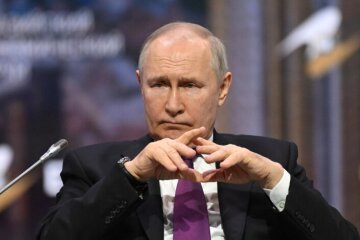If you don't understand the enemy's logic, it doesn't mean he lacks one. Among Russian security forces, there is a widespread view about the inevitable exhaustion and weakening of the Armed Forces of Ukraine due to large-scale desertion of servicemen. According to Russian calculations, no more than 10% of Ukrainian deserters return to the AFU, in fact, personnel losses during combat and the large number of deserters exceed the replenishment of the Armed Forces of Ukraine.
Thus, desertion of Ukrainian servicemen has the greatest impact on the AFU's numbers, allowing Russian occupiers to count on a breakthrough of the front.
Russians also believe that AFU losses exceed the replenishment of the Ukrainian army, moreover, the quality of replenishment is worse both physically and motivationally, resulting in the absence of frontline stabilization. The Ukrainians' hopes for a "wall of drones," according to Russians, have not been fully justified, since the shortage of personnel — infantrymen does not allow the AFU to stop the advance of Russian invaders.
When the General Staff of the AFU withdraws reserves from other sections of the front to stop breakthroughs and counterattacks, this immediately leads to crises in other frontline directions, which the Russians exploit by stretching the front, knowing full well about the personnel shortage in the Ukrainian army.
Therefore, without improving the quality of public administration, these problems will be impossible to solve. First, to reduce desertion, commanders must be "fathers"-mentors to servicemen, solve their problems, be an example to them, know about the situation on the battlefield and treat them with respect, not as "cannon fodder."
Second, many Ukrainian frontline soldiers are frankly surprised by the large number of servicemen in rear cities. It is no secret to anyone in the AFU that some commanders receive bribes from servicemen for obtaining combat participant status, although in reality they are in the rear. So this problem must be urgently resolved.
Third, there is still an opportunity to strengthen the mobilization of Ukrainian security forces, especially "young" pensioners, who, unlike forcibly mobilized Ukrainians, are better prepared for service in the AFU.
Fourth, Ukrainian authorities must shift from intimidation to using soft power, declaring amnesty for those Ukrainians who have not updated their military registration data if they do so.
It is also important to understand that sanctions are not currently capable of stopping Putin's Russia, which is capable of waging a high-intensity war against Ukraine for several more years. The situation in the Russian economy can be described as stagnation, slow decline in living standards, decrease in civilian production, decrease in investments in new technologies and production capacities, increasing technological lag and labor shortage. But at the same time, no economic collapse currently threatens the Russian Federation, which still has many reserves and resources to continue the war.
Ukraine now needs more increased military assistance from the USA and our European partners to stop Russia's advance and stabilize the frontline. As long as Russia is able to continue capturing Ukrainian territories, the advance of Russian occupiers will continue.
Talk about ending the war at the current frontline is perceived by Putin as an incentive to move the frontline even further into Ukrainian territory. By actually capturing new Ukrainian territories, Putin wants to confront the West with the fact of new territorial realities, and only the successes of the Armed Forces of Ukraine can destroy his plans.
To end the war, Donald Trump began using the wrong "cards," because first it was necessary to sharply increase military assistance for Ukraine, and only then, after stabilization on the frontline and strengthening Ukraine's negotiating position, start negotiations with Putin about a ceasefire.
Unfortunately, Ukraine became a victim of American political struggle, when military assistance to Ukraine was discredited by its alleged unprofitability for American taxpayers, whereas in reality this assistance was absolutely beneficial and cost-effective for the USA both economically and geopolitically.
Americans like to say that numbers don't lie, and the numbers show that military assistance from the USA and many European partners of Ukraine has decreased, so an absolutely logical question arises: why should Putin end the war now?
The Kremlin masterfully used the imitation of peace negotiations to buy time, playing bad "cop" Sergey Lavrov and good "cop" Kirill Dmitriev, through whom the Kremlin and Russian intelligence services conducted influence operations, including regarding Steve Witkoff, whom they "fooled."
Donald Trump often likes to say that he has always negotiated with the best, only Putin is not a businessman with whom the American president made deals, for him money is not in first place, he already lives in conditions of personal "communism," when all of Russia and all Russians are his resource and belong to him. Vladimir Putin thinks about greatness, his place in history and the revival of the empire, not about joint business projects of Russia and the USA.
The reality of the Russian führer shows him that the international liberal order has been dismantled, that the USA has ceased to be the world's policeman and leader of the liberal world, that the strengthening influence of the far-right and far-left in Europe can destabilize the EU from within and undermine the transatlantic alliance between the European Union and the USA, and he only needs to wait to witness these processes.
As for Ukraine, Putin does not consider it a real state, and he stated this to George Bush back in 2008, he told CIA Director William Burns in 2022, a month before the full-scale invasion, that Ukraine is not a real country. Putin also offered Polish Prime Minister Donald Tusk to divide Ukraine while visiting Sopot in 2009, therefore his Ukrainophobic views and position have never changed.
All the games and manipulations of the Russian führer are absolutely predictable, in fact Vladimir Putin is an "open book," the problem is only that many politicians, representatives of elites and intellectuals do not want to read it.
